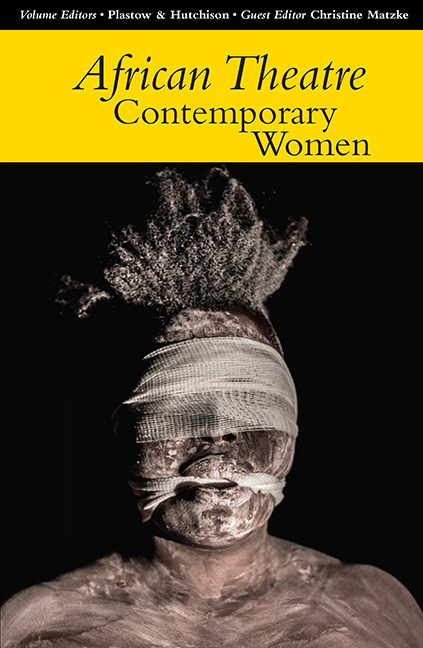Book contents
- Frontmatter
- Contents
- Notes on Contributors
- Editors’ Foreword: Women on the Front Line
- Introduction: Citizen & Artist: African women making theatre
- The Work of Dalia Basiouny: An artist's account
- Performativities as Activism: Addressing gender-based violence & rape culture in South Africa & beyond
- Exploring Poetic Voice in the Uganda Women's Intergenerational Theatre Project
- ‘After Images’: Impressions of the ‘after’ by South African performerchoreographer Mamela Nyamza
- Jalila Baccar of Tunisia: A portrait of an artist
- In Conversation: Interrogating & shifting societal perceptions of women in Botswana through theatre
- Binti Leo: Women in the arts in Tanzania
- Odile Gakire Katese: Making art & reinventing culture with women
- Contemporary Ethiopian Actresses
- Introducing The Sentence
- Playscript
- Book Reviews
Editors’ Foreword: Women on the Front Line
Published online by Cambridge University Press: 05 July 2016
- Frontmatter
- Contents
- Notes on Contributors
- Editors’ Foreword: Women on the Front Line
- Introduction: Citizen & Artist: African women making theatre
- The Work of Dalia Basiouny: An artist's account
- Performativities as Activism: Addressing gender-based violence & rape culture in South Africa & beyond
- Exploring Poetic Voice in the Uganda Women's Intergenerational Theatre Project
- ‘After Images’: Impressions of the ‘after’ by South African performerchoreographer Mamela Nyamza
- Jalila Baccar of Tunisia: A portrait of an artist
- In Conversation: Interrogating & shifting societal perceptions of women in Botswana through theatre
- Binti Leo: Women in the arts in Tanzania
- Odile Gakire Katese: Making art & reinventing culture with women
- Contemporary Ethiopian Actresses
- Introducing The Sentence
- Playscript
- Book Reviews
Summary
It is thirteen years since the African Theatreseries published its previous volume discussing the role of women in the performance cultures of the continent, where it became, and remained, the best selling volume in the series. There is an undoubted hunger amongst scholars, not only of theatre, but more widely of African culture and of African women's studies, to know more about women's contributions to the dramatic arts, and it is a hunger which the editors think remains to be satisfied. We therefore decided to produce a volume looking specifically at women working in the twentyfirst century, soliciting articles from as wide a range of perspectives – and countries – as we could find.
Women's contributions remain obscured in many discussions of African theatre. While thousands of women work in the industry, and some, for example Penina Mlama and Amandina Lihamba in Tanzania, and Zulu Sofola and Tess Onwueme of Nigeria, have won national fame, relatively few have achieved an international profile. This is partly because in many places theatre is performed in local languages, uses local theatrical idioms, and speaks to local concerns, so that someone like Elizabeth Melaku (discussed below in our article on Ethiopian actresses) who is a huge national star of stage and screen in Ethiopia, is utterly unknown to the non-Amharic speaking world. However, the issue of localism is not, of course, gender specific. So the question remains: why, while at least a small number of African men have become regular subjects of scholarship, is it still extremely hard to find out about the work of contemporary African women theatre artists?
On reading the articles in this volume it is difficult to avoid the conclusion that sexist inequalities, in a range of forms, have much to do with the matter. Actress, director and playwright Dalia Basiouny discusses the huge problems she experienced from a jealous, obstructive husband in developing her career; the essential context of the intergenerational women's theatre discussed by Kiguli and Plastow was that the Ugandan government and Buganda society at domestic and state levels discriminate against women's rights; and Sefi Atta's play, The Sentence, explicitly discusses the predicament of an underprivileged northern Nigerian woman faced with the ‘justice’ of an extreme interpretation of shari'a law.
- Type
- Chapter
- Information
- African Theatre 14: Contemporary Women , pp. xi - xiiPublisher: Boydell & BrewerPrint publication year: 2015

